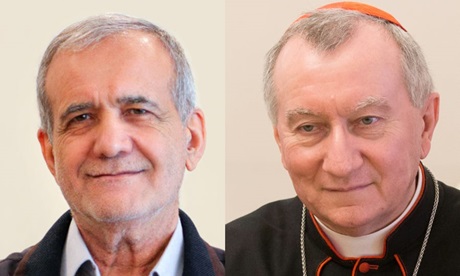The Vatican’s top diplomat cautioned against actions that would escalate conflict in the Middle East in a Monday morning phone call with Iran’s new president.
Cardinal Pietro Parolin’s Aug. 12 conversation with President Masoud Pezeshkian was well-timed.
Iran is widely believed to be preparing to attack Israel following the July 31 assassination of Hamas political leader Ismail Haniyeh in the Iranian capital, Tehran.
The Holy See press office said that the Vatican Secretary of State congratulated Pezeshkian on assuming office, after his victory in a July election triggered by his predecessor Ebrahim Raisi’s death in a helicopter crash.
Parolin “expressed the Holy See’s serious concern regarding current events in the Middle East, reiterating the need to avoid by any means the spread of the very grave ongoing conflict, instead favoring dialogue, negotiation, and peace,” the press office said.
Is it surprising that Pezeshkian took Parolin’s call as Iran reportedly gears up for a strike on Israel? How far do Holy See-Iran relations go back?
And why does the Vatican invest in relations with a country that the U.S. cut ties with in 1980 and categorizes as a state sponsor of terrorism?
The Pillar takes a look.
Was the call surprising?
When world leaders are on the warpath, they are typically reluctant to take phone calls from the Vatican.
While they may appreciate Holy See diplomacy in abstract terms, they are usually unwilling to listen directly to the Vatican’s appeals for restraint and negotiation.
When Russia launched its full-scale invasion of Ukraine in 2022, for example, President Vladimir Putin eluded Pope Francis’ attempts at a direct conversation.
Why was Pezeshkian willing to pick up the phone to Parolin? Was it because he’s new to the top office? Or was he expecting a quick congratulatory call with little substance?
These hypotheses are unlikely, given that Pezeshkian has been in politics for more than a quarter-century. More likely is that Iran’s new president thought the call would be beneficial.
How so? An account of the conversation on the Iranian president’s website offers clues.
The readout says:
“Emphasising the principled positions of the Islamic Republic of Iran in avoiding war and promoting world peace and security, the president considered and clarified that the actions of the Zionist regime in killing women and children, as well as the criminal act of this regime in the assassination of the guest of our country, are against all humanitarian and legal principles.”
“According to all international standards and regulations, the right to defend and respond to the aggressor is reserved for the aggressed country.”
Pezeshkian seems to have seen the phone call as a chance to present Iran as a country committed to international law, yet constrained to defend itself against external aggression.
The statement also appeared to suggest that Iran and the Holy See’s positions on Gaza were compatible, if not exactly the same.
Cardinal Parolin, it said, noted that the Vatican wished to see “an immediate end to the killing of civilians in Gaza and the immediate establishment of a ceasefire.”
The Iranian president, for his part, “considered the genocide and the killing of oppressed women and children in Gaza, the cowardly assassinations in the countries of the region, and the attack on hospitals and schools where refugees are housed, as part of the criminal actions of the Zionist regime.”
Pezeshkian was no doubt aware that news of his conversation with Parolin would likely reach a global audience.
So the president probably concluded that it was in his overall interest to engage directly with the Vatican, seizing the opportunity to portray Iran as an unjustly injured party and any retaliatory action as self-defense.
- First published by RNS
- Luke Coppen is The Pillar’s Senior Correspondent.
News category: Analysis and Comment.




